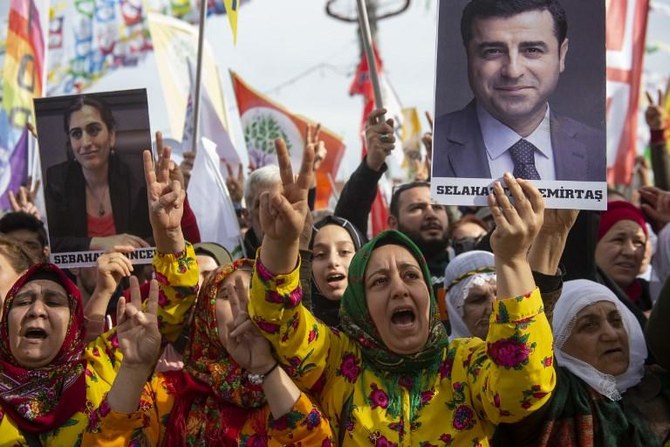ISTANBUL: Thousands of supporters of a pro-Kurdish party gathered Sunday in Istanbul to celebrate the Kurdish New Year and to attend a campaign rally for local elections that will test the Turkish president’s popularity.
The Peoples’ Democratic Party, or HDP, held the event amid the municipal office races that have become polarizing and a government crackdown on its members for alleged links to outlawed Kurdish militants.
Party lawmakers, including former chairman Selahattin Demirtas, and mayors have been jailed. Supporters at Sunday’s rally waved HDP flags and chanted slogans for Demirtas and the imprisoned leader of the outlawed Kurdistan Workers’ Party, or PKK.
Security at Sunday’s event was heavy and police controlled the rally entrance, but the atmosphere was celebratory.
The Newroz fire, which symbolizes purification and the arrival of spring, was burning in Istanbul, following days of celebrations in southeastern Turkey.
The party has fielded candidates for the March 31 votes in Turkey’s predominantly Kurdish southeast but is sitting out critical races in Turkey’s major cities, including Istanbul and Ankara.
The strategy is intended to deliver HDP votes to Turkey’s main secular opposition Republican People’s Party so it can challenge Turkish President Recep Tayyip Erdogan’s ruling party.
Millions of ethnic Kurds will vote in the elections. Erdogan, who is also campaigning for Kurdish votes, plans to hold a massive election rally near HDP’s on Sunday.
In the southeast, the party aims to win back control of municipalities that were seized by the government during a state of emergency declared after the 2016 failed coup. Government-appointed trustees replaced elected officials in nearly a hundred municipalities.
In October, Erdogan threatened not to accept such an outcome.
“If people involved with terror are chosen in the ballot boxes in these elections, we’ll immediately do what’s necessary and continue on our path by appointing trustees,” he said.
The government accuses HDP politicians of links to PKK, and Erdogan regularly brands them terrorists and traitors. The HDP does not deny such links but says it only advocates for Kurdish rights and democracy through legal, political means.
The PKK, considered a terror group by Turkey and its Western allies, has waged an insurgency since 1984 and the conflict has claimed tens of thousands of lives.
A fragile cease-fire held for more than two years as the Turkish government, HDP politicians and the PKK’s jailed leader, Abdullah Ocalan, negotiated a peace process.
But the resumption of hostilities in the summer of 2015 brought clashes to southeastern cities where round-the-clock curfews were declared. Since then, at least 4,280 people have been killed, including civilians, according to the International Crisis Group.
A string of bomb attacks claimed by PKK and its offshoots hit Turkish cities in 2016 and 2017 and the country’s jets regularly strike PKK camps in the mountainous regions of northern Iraq.


























